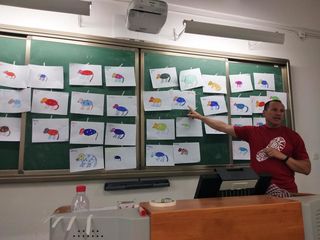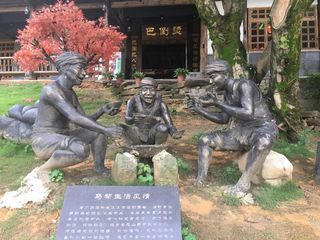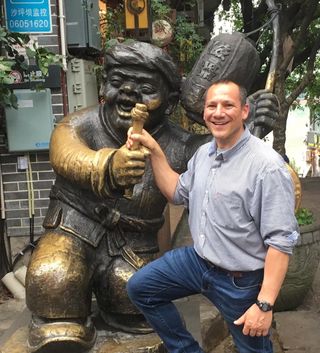Mating
Beyond Diversity
What a recent trip to China taught me about human universals.
Posted May 30, 2018

Diversity is truly a wonder and is something to be embraced. It is a hallmark of the human condition. People come in all kinds of shapes and sizes. We vary from one another in physical traits, such as how tall we are or how wavy our hair is. We vary from one another in terms of personality – in terms of how loud or quiet we are in our dispositions. We vary from one another in the languages and cultural traditions that we follow. We vary from one another in terms of our political beliefs. Some of us hear Yanni while some of us hear Laurel …
I recently had the privilege of visiting Chongqing, one of the world’s largest cities, deep in the center of China. There, I taught a course related to evolution and behavior to a group of 80 bright and eager students at Chongqing University of Education. I had never been to China before – so, as a human, I was left only with some vague (and, as it turns out, misguided) expectations.. Based on simply growing up in the USA, here is what I expected:
- The city might seem behind the times, lagging in terms of technology and infrastructure.
- The university might not be up to speed in terms of organizational structure, curriculum, space, or technology.
- The nation as a whole might seem a little bit culturally behind.
Spoiler alert: Not an ounce of this was true.
Chongqing is a major international city that is many times the size of New York City. The infrastructure seemed totally on a par with what you would see in a major city in the US. The roads are well taken care of and the traffic is well-controlled. People have nice cars. Throughout the city, people use bar codes on their phones to make pretty much all financial transactions. In terms of the university, I was truly impressed with the campus, the faculty, the administration, and, especially, the students. Nestled in the mountains on the east side of the city, the campus, which is cutting-edge from top to bottom, is truly world-class. The faculty and administrators are extremely well-educated and are up on the current trends in higher education. And the students were simply amazing. Many of them are among the hardest-working and brightest I have ever worked with. Further, they are totally up on the “modern trends” that we find “in the West.” These people are not “culturally backward” at all! Quite the opposite, in fact.
At the end of the day, I have to say that my overall impression of the nation was very positive. While China may not be perfect, I now understand why this nation is such a force in the modern global economy.
What a Trip to China Taught Me about Human Universals

As humans, our minds are very prone to noticing things that are different. And sure, if you’re an American and you visit China, some differences will conspicuously stand out. Chopsticks are used in China while we use forks in New York. It is OK to have a dog off the leash in any part of the city of Chongqing. It is not OK to have a dog off the leash in most parts of Manhattan. In China, people do not say something comparable to “bless you” when someone sneezes (I don’t know why). Finally, in New York, if you saw a tomato, you’d say Toh-Mae-Toe - while in Chongqing, you’d say She-hong-shi. And so on.
As an evolutionist, my work is deeply inspired by commonalities that exist across human cultures. And my trip to China was full of reason to believe in the fact that human universals connect people from across the globe. Here are examples of human psychological universals that my trip to China taught me.
- Emotions truly are cross-culturally universal. Since Darwin wrote The Expression of Emotion in Man and Animals in 1872, evolutionary thinkers have considered human emotions as an adaptation that functions to facilitate communication across members of our species.
- My students from Chongqing all have English as a second language. While many of them have very good English skills, I found myself communicating using a cross-section of language, non-verbal gestures, and, believe it or not, emojis! In fact, I found emojis to be extremely powerful in getting many of my main points across. And in hearing what the students were trying to convey. When students were worried that the readings would be too advanced, I was able to use a “don’t worry” emoji, to which they quickly responded with “relief” emojis. When I held an intensive review session outside of class time, many of the students messaged me with “appreciation” and “happy” emojis. When I said something in class or online that didn’t make sense (it happens!), students sent me “confused” or “anxious” emojis. This worked! I got it. Yes, emotions do provide a universal language.
 Source: Glenn Geher
Source: Glenn Geher
- My students from Chongqing all have English as a second language. While many of them have very good English skills, I found myself communicating using a cross-section of language, non-verbal gestures, and, believe it or not, emojis! In fact, I found emojis to be extremely powerful in getting many of my main points across. And in hearing what the students were trying to convey. When students were worried that the readings would be too advanced, I was able to use a “don’t worry” emoji, to which they quickly responded with “relief” emojis. When I held an intensive review session outside of class time, many of the students messaged me with “appreciation” and “happy” emojis. When I said something in class or online that didn’t make sense (it happens!), students sent me “confused” or “anxious” emojis. This worked! I got it. Yes, emotions do provide a universal language.
- Human relationships are interesting to people across the globe. In a prolific body of research, David Buss (2003) has famously shown that issues of human mating are central to the human experience. Behaviors related to human mating most directly bear on Darwin’s bottom line of reproductive success. So from an evolutionary perspective, it makes good sense that issues of human mating would be central to people from across the globe.
- Well for my students in Chongqing, my class was their first-ever exposure to the ideas of evolutionary psychology. And I have to say, when I started talking about the psychology of human mating, including the evolution of sex differences in mating strategies as related to asymmetries in parental investment across the sexes, it was like someone turned on a bright light in the room. The students were so obviously interested and they were quite vocal about it. Point after point that we discussed, students shouted out things like “yes, I see that!” and “that is true!” In fact, this same material is famously of interest to students of evolutionary psychology from other corners of the globe as well.
- Family matters no matter where you are. From an evolutionary perspective, family is critical, particularly as kin are individuals with whom people share genes and, thus, kin share an evolutionary interest in the success of one another (see Hamilton, 1964).
- The fact that family matters to the people of Chongqing is palpable. In informal conversations with faculty and administrators, the issue of family always came up. Do you have kids? How old? What do they like to do? Do you have family members nearby who help to take care of them? etc. In talking with my students about their long-term plans and their lives outside the classroom, family always came up. Many of them had plans to travel with their families later in the summer. Many of them regularly go home to be with their families each weekend. They talk glowingly about the annual Spring celebration when everyone in the country stops what they are doing to go home to be with family. Sounds like Thanksgiving to me!
-
 Source: Tabitha Holmes
Source: Tabitha HolmesIndividuals within a population vary from one another. One of the core features of Darwin’s basic principles of natural selection is this: Individuals show variability from one another within populations – along a variety of traits. The entire field of Personality Psychology (i.e., Psychology of Individual Differences) focuses on how such variability plays out in human behavior. I have been teaching college students in the United States since 1994. I know how they vary from one another. Some sit in the front and will never miss a class – no matter what. Some raise their hands and engage in discussions in each class period. Some sit quietly during class but take it all in. Some like to think outside the box, engaging in discussions with me about applications of the content beyond the classroom. Some are relatively apathetic.
- Students in Chongqing show just as much variability as is found in students in the US! My experience in teaching over the decades totally prepared me for the many differences that I found among my students in Chongqing. They varied from each other in exactly the same ways that my students in the US vary from one another! Some are extremely introverted. Others are extremely extraverted. Some focus very much on the details of what will be on the test. Some focus more on how the ideas from the class apply in the real world. Some challenge the material and ask probing questions. Some seem to quietly take it all in. Some are early for every class period. Some are late for every class period. Even the ways that people vary from one another within a population shows consistency across what are considered dramatically different cultures!
- Food has a social component. The sharing of food goes way back in the history of human evolution (see Wrangham, 2009). Food is, perhaps, the ultimate survival-based resource and sharing of food is, perhaps, the prototype of an altruistic act. Sharing of food with others signals friendship. It is designed to cultivate reciprocal bonds and trust. Sharing of food says this: I care about you – and you can count on me. And I have resources and am willing to share them with you.
 Source: Glenn Geher
Source: Glenn Geher- The generosity of the people in Chongqing when it comes to food sharing is unparalleled. My colleagues from New York and I were treated to some of the greatest meals I have had in my life. From students to faculty to administrators, everyone was happy to bring us out and treat us to some amazing meals. Chongqing is famous for their “hot pot” meals – which are truly something else! The hot pot meal starts with a large steel bowl that is heated in the middle of the table. At its base is a combination of chicken broth, HOT peppers, and regional spices. Once the base heats up, it is time to start cooking! The meal is truly interactive, with the diners putting all kinds of raw food (meat, fish, mushrooms, sprouts, eggs, greens, lotus root, etc.) into the hotpot to cook. The result: fun and delicious! My colleagues and I were treated to a hot pot meal at an amazing hot pot restaurant, nestled along the edge of an ancient mountain. And, without fail, they insisted on paying. It was, simply, a wonderful and unforgettable experience. While we hope to reciprocate this generosity when these students and colleagues come to visit New York in the next few years, I have to say that my friends from Chongqing have set the bar pretty high.
 Source: Glenn Geher
Source: Glenn Geher
- The generosity of the people in Chongqing when it comes to food sharing is unparalleled. My colleagues from New York and I were treated to some of the greatest meals I have had in my life. From students to faculty to administrators, everyone was happy to bring us out and treat us to some amazing meals. Chongqing is famous for their “hot pot” meals – which are truly something else! The hot pot meal starts with a large steel bowl that is heated in the middle of the table. At its base is a combination of chicken broth, HOT peppers, and regional spices. Once the base heats up, it is time to start cooking! The meal is truly interactive, with the diners putting all kinds of raw food (meat, fish, mushrooms, sprouts, eggs, greens, lotus root, etc.) into the hotpot to cook. The result: fun and delicious! My colleagues and I were treated to a hot pot meal at an amazing hot pot restaurant, nestled along the edge of an ancient mountain. And, without fail, they insisted on paying. It was, simply, a wonderful and unforgettable experience. While we hope to reciprocate this generosity when these students and colleagues come to visit New York in the next few years, I have to say that my friends from Chongqing have set the bar pretty high.




Bottom Line
As an evolutionist, I guess I see things a little bit differently. In my recent trip to Chongqing, deep in the center of China, I didn’t see substantial differences between the people there versus the people in my home state of New York. I saw similarities. This trip, as much as any other experience I have had, truly put a face to the idea for me that people are people wherever you go. The people of Chongqing care about the same things that the people in New York care about. Like the people from New York, the people of Chongqing care about family. Like the people from New York, the people of Chongqing care about relationships. Like the people from New York, the people of Chongqing share food as a sign of friendship and trust. Like the people from New York, the people of Chongqing use our shared emotion system to communicate. At the end of the day, whatever corner of the world people come from, we all have the same hopes, dreams, and concerns regarding the future. Our single shared future.
Diversity matters. But so does human universality. We must never forget that. If you want to experience diversity and human universality in one fell swoop, spend some time in a country that you perceive as very “different” from your own – you will be amazed at how much you have in common with the people there. You will be reminded that we are all passengers on the same train.
References
Buss, D. M. (2003). The evolution of desire: Strategies of human mating (Revised edition). New York: Basic Books.
Darwin, C. (1872). The expression of the emotions in man and animals. London, UK: John Murray.
Hamilton W.D. (1964). "The genetical evolution of social behaviour. I". J. Theor. Biol. 7, 1–16.
Larsen, R., & Buss, D. M. (2017). Personality Psychology. New York: McGraw Hill.
Wrangham, R. (2009). Catching Fire: How Cooking Made Us Human. New York: Basic Books.


